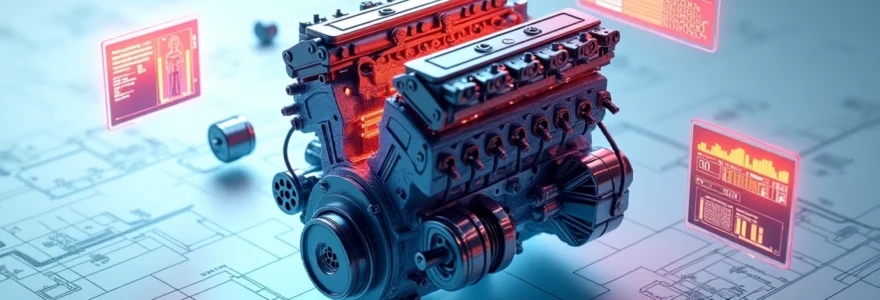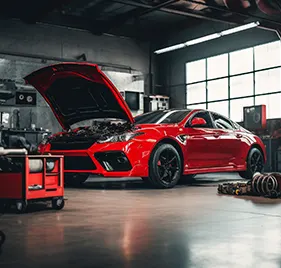Engine maintenance is the cornerstone of vehicle longevity and performance. A well-maintained engine not only ensures optimal fuel efficiency but also prevents costly breakdowns and extends the life of your vehicle. Whether you're a seasoned mechanic or a car enthusiast, understanding the intricacies of engine care is crucial for keeping your vehicle running smoothly for years to come.
Engine oil analysis and replacement intervals
One of the most critical aspects of engine maintenance is proper oil management. Engine oil serves as the lifeblood of your vehicle, lubricating moving parts and preventing excessive wear. Regular oil analysis can provide valuable insights into the health of your engine, detecting early signs of wear and contamination.
Oil replacement intervals have evolved with advancements in engine technology and oil formulations. While the old rule of thumb was to change oil every 3,000 miles, many modern vehicles can go 5,000 to 7,500 miles between changes. However, these intervals can vary based on driving conditions and vehicle specifications.
Regular oil analysis is like a health check-up for your engine, revealing hidden issues before they become major problems.
To determine the optimal oil change frequency for your vehicle, consider factors such as:
- Manufacturer recommendations
- Driving habits (short trips vs. highway driving)
- Environmental conditions (extreme temperatures, dusty environments)
- Vehicle age and mileage
Using high-quality synthetic oils can often extend the interval between changes, but it's crucial to balance cost savings with engine protection. Remember, changing your oil too frequently is better than waiting too long and risking engine damage.
Fuel system maintenance and injector cleaning
The fuel system is another critical component that requires regular attention. Over time, deposits can build up in fuel injectors, affecting spray patterns and reducing efficiency. Clean fuel system maintenance can improve engine performance, fuel economy, and emissions.
Gasoline direct injection (GDI) system care
GDI systems have become increasingly common in modern vehicles, offering improved fuel efficiency and power. However, they are prone to carbon buildup on intake valves. Regular use of fuel system cleaners and periodic professional cleaning can help maintain optimal performance.
For GDI engines, consider the following maintenance tips:
- Use top-tier gasoline with detergent additives
- Perform fuel injector cleaning every 30,000 miles
- Consider walnut blasting for severe carbon buildup
Diesel common rail injector maintenance
Diesel engines with common rail injection systems require special attention. These high-pressure systems are sensitive to fuel quality and contamination. Regular fuel filter replacements and using quality diesel fuel additives can help prevent injector issues.
Carburetor tuning for classic engines
For enthusiasts maintaining classic vehicles, carburetor tuning remains an essential skill. Proper adjustment of fuel mixture and idle speed can significantly improve engine performance and fuel economy in carbureted engines.
Fuel filter replacement schedules
Fuel filters play a crucial role in protecting your engine from contaminants. Most manufacturers recommend replacing fuel filters every 30,000 to 50,000 miles. However, if you frequently drive in dusty conditions or use lower-quality fuel, more frequent replacements may be necessary.
Timing belt and chain inspection techniques
The timing belt or chain is a critical component that synchronizes the rotation of the crankshaft and camshaft. Failure of this component can lead to catastrophic engine damage in interference engines.
Interference vs. Non-Interference engine considerations
Understanding whether your engine is an interference or non-interference type is crucial when assessing the risks of timing belt or chain failure. In interference engines, valve and piston paths overlap, meaning a timing failure can result in valve-to-piston contact and severe engine damage.
Timing chain tensioner and guide wear assessment
While timing chains are generally more durable than belts, they still require periodic inspection. Pay attention to unusual noises, such as rattling or whining, which may indicate worn tensioners or guides. Many modern engines use variable valve timing systems that rely on proper chain tension for optimal performance.
Belt tension measurement using Gates Krikit tool
For vehicles with timing belts, proper tension is critical. The Gates Krikit tool is a popular device for measuring belt tension accurately. Correct tension ensures proper valve timing and prevents premature wear of the belt and associated components.
Proper timing belt or chain maintenance is like ensuring the heartbeat of your engine remains steady and strong.
When inspecting timing components, consider the following:
- Check manufacturer's recommended replacement intervals
- Inspect for visible signs of wear or cracking
- Listen for unusual noises during engine operation
- Consider replacing water pump and other associated components during belt replacement
Cooling system efficiency and coolant maintenance
An efficient cooling system is essential for preventing engine overheating and maintaining optimal performance. Regular coolant maintenance helps prevent corrosion and ensures proper heat transfer.
Key aspects of cooling system maintenance include:
- Checking coolant levels and concentration
- Inspecting hoses and belts for signs of wear
- Flushing and replacing coolant at recommended intervals
- Testing the thermostat and radiator cap functionality
Modern engines often use long-life coolants that can last up to 100,000 miles. However, it's still important to perform regular inspections and top-ups as needed. Using the correct type of coolant for your vehicle is crucial, as mixing incompatible coolants can lead to chemical reactions and system damage.
Air intake and filtration system optimization
A clean and efficient air intake system is vital for optimal engine performance. Proper filtration prevents abrasive particles from entering the engine, while ensuring adequate airflow for combustion.
Cold air intake vs. short ram intake performance
Aftermarket intake systems can offer performance benefits, but it's important to understand the differences. Cold air intakes typically draw air from outside the engine bay, providing cooler, denser air for improved power. Short ram intakes are more compact, but may draw in warmer air from the engine bay.
MANN+HUMMEL FilterMinder technology for filter life monitoring
Advanced filter monitoring systems like MANN+HUMMEL's FilterMinder can provide real-time data on filter condition. This technology helps optimize replacement intervals, ensuring you change filters when necessary without wasting resources on premature replacements.
Turbocharger compressor wheel cleaning procedures
For turbocharged engines, maintaining a clean compressor wheel is crucial for efficiency. Over time, oil and debris can accumulate, reducing turbocharger performance. Professional cleaning or careful DIY procedures can help restore turbocharger efficiency.
When maintaining your air intake system, consider these tips:
- Inspect air filters regularly, especially in dusty environments
- Clean MAF sensors and throttle bodies as part of routine maintenance
- Check for leaks in intake plumbing that could introduce unfiltered air
- Consider upgrading to high-flow air filters for performance applications
Electronic diagnostics and ECU maintenance
Modern engines rely heavily on electronic control units (ECUs) to manage various systems. Regular diagnostics can help identify issues before they lead to performance problems or failures.
Key aspects of electronic diagnostics include:
- Scanning for diagnostic trouble codes (DTCs)
- Monitoring live data streams for anomalies
- Performing software updates as recommended by manufacturers
- Checking sensor functionality and calibration
Many enthusiasts use OBD-II scanners for basic diagnostics, but professional-grade tools can provide more in-depth analysis. Regular ECU maintenance, including keeping software up-to-date, can improve fuel efficiency, performance, and emissions control.
While DIY diagnostics can be helpful, complex issues often require professional expertise. Don't hesitate to consult a qualified technician for advanced electronic diagnostics and repairs.

